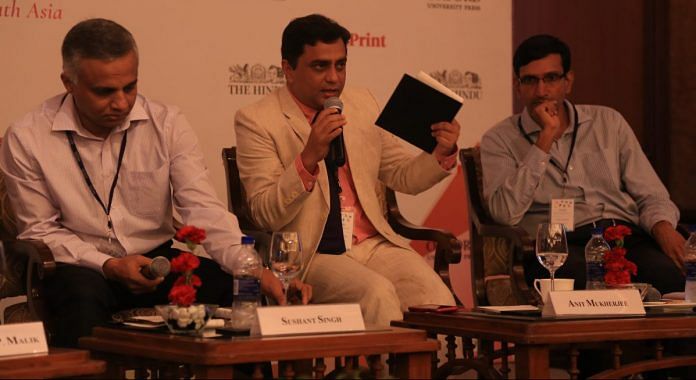Panelists at a session of the South Asia Conclave 2018 discuss a book that questions the lack of communication between the two sides and its toll.
New Delhi: India has managed to avert the kind of military coups, executed or attempted, that have plagued neighbours Pakistan and Bangladesh, but civilian control has come at the cost of a gaping communication gap between the armed forces and the government.
This is the argument offered by Anit Mukherjee, a former Major in the Indian Army, in his book The Absent Dialogue: Civil – Military Relations in India, which was up for discussion at the second session of South Asia Conclave 2018 in New Delhi Wednesday.
The conclave, organised by the Oxford University Press and in its second edition this year, seeks to offer a platform where issues related to south Asia, one of the world’s fastest-growing regions, are discussed and debated.
“There is an absent dialogue, there is not enough conversation that takes place between the ministry of defence and the military in the country,” said Mukherjee, one of the panelists at Wednesday’s session.
Mukherjee, an assistant professor at the S. Rajaratnam School of International Studies, Singapore, was in conversation with moderator Sushant Singh, an associate editor at The Indian Express, on a panel of experts that also included former Army chief General Ved Prakash Malik (Retd), Srinath Raghavan, a senior fellow at the Centre for Policy Research, and Colonel Ajai Shukla (Retd), a consulting editor on strategic affairs for Business Standard.
The former Major said “civil-military relations involved the interaction between bureaucrats, politicians and senior military officers”, adding that there was “major mistrust” between the two branches in India.
“The absence of conversation has affected the military’s effectiveness. We lack civilian expertise, there is a strong bureaucracy control, and the military is not autonomous,” he said.
“Although we are changing,” he added, “it is little. The BJP government has done just the minimum.”
General Malik, who led the Army during the Kargil war, agreed with Mukherjee. “Dialogue is almost absent. It is going to be worse in the coming years.”
“Civilians do not have an insight into the Army’s operations, and that’s where the problem arises. The ministry of defence neglects the military during times of peace, but during the war it becomes over-engaged,” he said.
Civilians did not understand the planning that goes behind military operations, General Malik said, adding that the government should provide guidance in case of threats, what kind of threats they are, and the funds pushed into the military.
However, Shukla and Srinath remarked that the book ignored some aspects of the military.
Shukla said though the book covered military operations undertaken during the tenures of prime ministers from Jawaharlal Nehru to Atal Bihari Vajpayee, it did not discuss those carried out during Narendra Modi’s rule.
Srinath added that lack of expertise was not a problem of the civilian government alone and also existed in the military. “Why should we see only the lack of expertise of civilians? Military officers have little knowledge about policy-making.”
Another evocative theme emerged from an audience question, as Major General Ashok. K. Mehta (Retd) referred to recent reports about the increasing politicisation of the military vis-à-vis the handling of the 2016 surgical strikes. “The military needs to be secular,” he said.



